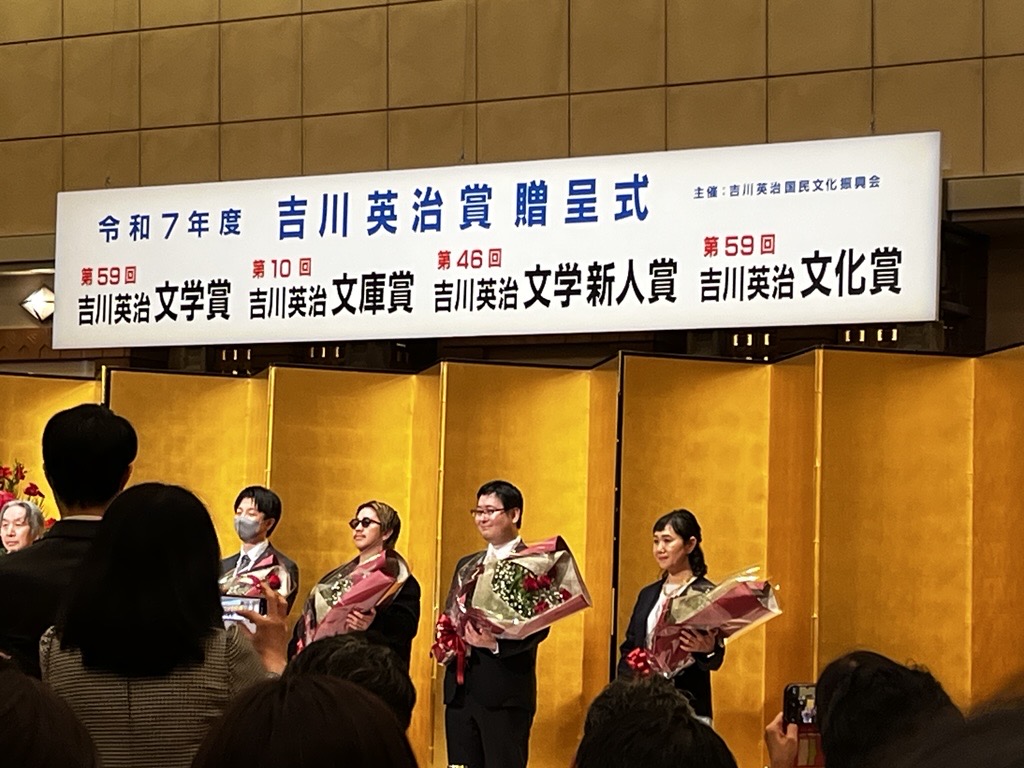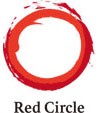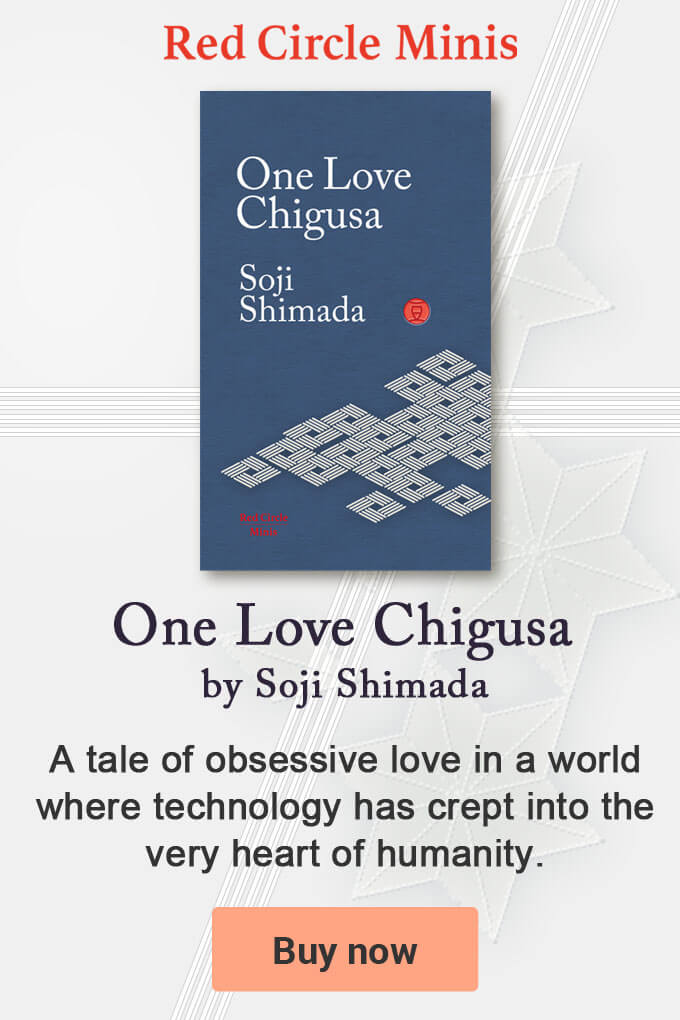 59th Yoshikawa Eiji Prize For Literature Awards Ceremony Tokyo April 2025
59th Yoshikawa Eiji Prize For Literature Awards Ceremony Tokyo April 2025Mitsuyo Kakuta, the prolific and hugely popular Japanese author has done it again and won yet another Japanese literary award. This time the Yoshikawa Eiji Prize for outstanding popular fiction for her novel Hakobune o moyasu (Burning the Ark), a captivating and unsettling tale about belief and delusion, which was originally serialised over a one-year period in the weekly news magazine Shukan Shincho between 2022 and 2023. Before being updated and published in book format in 2024.
The author was presented with her latest prize at a ceremony held in Tokyo last week. Kakuta, one of Japan’s most widely read contemporary writers, has won many other highly prestigious awards including the Naoki, Noma and Yasunari Kawabata Prize and more. Her latest prize-winning novel connects two Japanese eras; the Showa era, with its heady economic growth, and Heisei, with its so-called lost decades of stagnation, and two individuals, each with their own strongly held set of beliefs shaped by their circumstances.
 Cover of Hakobune o moyasu (Burning the Ark) by Mitsuyo Kakuta published 2024
Cover of Hakobune o moyasu (Burning the Ark) by Mitsuyo Kakuta published 2024Burning the Ark brilliantly combines and contrasts social history, and real events with the innate desire many have in Japan to believe in something that helps define them and allows them to “belong”. A desire when “fulfilled” that can also provide comfort in a society that is often beneath the surface uncomfortable for many.
Kakuta slowly draws her readers in with her depictions of major real events that skillfully capture the times and its atmosphere. Such as airplane crashes, earthquakes, and occult fads; cunningly manipulating and challenging readers to question why we believe in the things we do and why we often keep on believing.
Originally, Kakuta planned to write a tale about rumours, their propagation and individuals caught up in hoaxes or a fraud but then decided to focus her narrative on the concept of belief itself. She went back to an incomplete 40-page manuscript she had written a decade earlier following a research trip, a rather unusual approach for her, as she embarked on this highly impressive and now award-winning serial.
“I realised I’m more interested in what people end up believing, rather than what they’re deceived by. When you think about it, even the war, the idea that ‘Japan will win’ was a rumour that dragged in the whole nation. So, I wanted to write about ‘those of us who swallowed it whole’, ‘those of us who contributed by believing’.”
The first part of this long 425-page novel covers debunked beliefs such as the obsessions many people in Japan had about Nostradamus (1503-1566) and his predictions, Uri Geller and his spoons, out-of-fashion child-rearing myths, UFO abductions, vaccine hesitancy and the fear of the so-called millennium software bug, which we all now know didn’t actually happen as expected, despite the strong belief held by many at the time of it devastating impact.
The second part of the book is set in a much more recent period when the narrative’s two protagonists who live distinct lives meet in a cafe and intersect. It spans more recently held beliefs and events such as the covid pandemic. Including aspects of which due to their more recent history are much less easy to refute, laugh at, or describe as delusional, hysteria, urban legends, or instinctively discarded as fake news.
Kakuta explains her narrative approach as “Some rumours are spread for fun, but I think many are rooted in a desire to help people. When I thought about this, the first thing that came to mind was Noah’s Ark. The Noah in the Bible just silently built a boat by himself, and he didn’t go around stating things like, ‘God is angry and everyone is going to die,’ but I think that if the flood hadn’t occurred, Noah would have been seen as a strange individual who suddenly started saying the world was going to end.” Perhaps even branded as a rumour-monger or a crank.
Reader feedback has been terrific and accordingly to many online reviews as the tale unwinds, often reportedly generating a blanket-like comforting sense of nostalgia, the title’s meaning becomes apparent. Leaving many asking themselves what was it that they actually believed in. While in parallel questioning their own ability to distinguish between truth and lies, and reality and rumour.
Interestingly, this is not the first time that a Kakuta novel has drawn inspiration for its title or its narrative theme from the Bible. Another fascinating example is her critically acclaimed novel Tarento, The Talents, which was initially serialised in Japan’s largest national newspaper the Yomiuri Shimbun.
Events and how they are communicated can bend the facts. In Burning the Ark Kakuta ruminates on the communication tools of each era; pagers and social media, for instance. “In addition to the main theme of rumours, another thing I wanted to write about this time was communication methods.”
“In the Showa era, written correspondence gave way to telephones, then pagers, things like telephone clubs were created, PHS and cell phones appeared, and the Internet became widespread. Compared to the time when people wrote letters one by one, social media is an incredible evolution, but when you think about what we are actually communicating through it, there is a lot of pointless content. Communication methods may have evolved, but I feel that the things we are communicating using them are on the same level as the great prophecies of Nostradamus.”
One online reviewer describes Kakuta’s deftly constructed narrative as “a novel that made me feel like I was living two lives at once, where I could feel that the attitude of those around me changed no matter what I believed, and the life I trod also gradually evolved”.
Burning the Ark is designed to reminds its readers of the importance of thinking for yourself and the dangers of simply accepting the opinions and claims of others. It is captivating readers but also prompting them to confront unsettling questions about their own views and cultural dissonance especially as they reach its final pages.
The Yoshikawa Eiji Prize, launched in 1967, is named after Eiji Yoshikawa (1892-1962) often described as one of Japan’s best and most consequential authors of historical fiction. English language translations of his works about epic wars, feudal Japan and the way of the samurai include the Musashi series published by HarperCollins. Many of his works, like Kakuta’s, have been adapted for film and television in Japan.
 About Red Circle:Red Circle Authors Limited is a specialist publishing and communications company that conducts bespoke projects on behalf of a carefully selected and curated group of leading Japanese authors. Red Circle showcases Japan’s best creative writing. For more information on Red Circle, Japanese literature, and Red Circle authors please visit: www.redcircleauthors.com.
About Red Circle:Red Circle Authors Limited is a specialist publishing and communications company that conducts bespoke projects on behalf of a carefully selected and curated group of leading Japanese authors. Red Circle showcases Japan’s best creative writing. For more information on Red Circle, Japanese literature, and Red Circle authors please visit: www.redcircleauthors.com.



